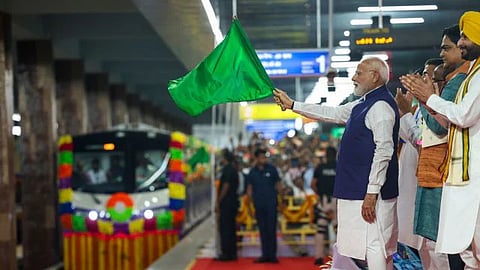PM Modi inaugurates Kolkata metro stations, expressway projects
India's metro network has grown from 250 km before 2014 to more than 1,000 km today

Prime Minister Narendra Modi on Friday inaugurated a series of infrastructure projects in Kolkata, describing them as a “major leap” in the city’s connectivity and urban development.
The initiatives include three new stretches of the Kolkata Metro and a six-lane elevated expressway, aimed at cutting down travel times and easing congestion in one of India’s busiest metros, local media reported.
The Prime Minister also unveiled and laid foundation stones for development projects worth ₹5,200 crore (around $626 million).
New metro services flagged off
Modi flagged off Metro trains from Jessore Road Metro Station, formally opening the Sealdah–Esplanade, Beleghata–Hemanta Mukhopadhyay, and Noapara–Jai Hind Bimanbandar sections.
He also rode the Metro with schoolchildren and shramjivees (workers), highlighting the role of the upgraded transport system in easing daily commutes.
The inauguration event was attended by Governor C.V. Ananda Bose, Railway Minister Ashwini Vaishnaw, and Shipping & Waterways Minister Shantanu Thakur, though no representative of the state government was present.
Modi also laid the foundation stone for a new subway at Howrah Metro Station, which will further strengthen multimodal connectivity.
‘Accelerating Bengal’s growth’
Addressing the gathering, Modi said he was glad to once again “accelerate the development of West Bengal.”
Sharing his metro journey experience, he congratulated Kolkata’s citizens, noting that the modernisation of transport would be crucial as India moves toward becoming the world’s third-largest economy.
“Cities such as Kolkata embody both India’s history and its future,” he said, adding that hubs like Dum Dum and the airport area will play a pivotal role in the country’s economic rise.
Expanding India’s metro footprint
The Prime Minister noted that India’s metro network has grown fourfold in a decade — from 250 km before 2014 to more than 1,000 km today, making it the third-largest in the world.
For Kolkata, about 14 km of new lines and seven additional stations are being integrated, enhancing the “ease of living and travel” for residents.
He also highlighted India’s push toward green mobility, citing the expansion of EV charging points, electric buses, and the ‘Waste to Wealth’ initiative that turns urban waste into electricity.
Faster rail and air links
Modi stressed the importance of connecting two of India’s busiest rail terminals — Howrah and Sealdah — via Metro.
Travel between the stations, which once took 90 minutes, will now take just minutes. The new Howrah subway, he added, will cut interchange times and simplify train transfers.
Kolkata Airport is now linked to the Metro as well, a move expected to improve access for passengers across the city.
He also announced that West Bengal has achieved 100% railway electrification, and pointed to new train services, including nine Vande Bharat trains and two Amrit Bharat trains already serving the state.
Road connectivity boost
Alongside the metro projects, Modi inaugurated the 7 km, six-lane Kona Expressway, built at a cost of ₹1,200 crore (about $145 million). The expressway is expected to significantly reduce congestion and improve road traffic flow in and out of Kolkata.






